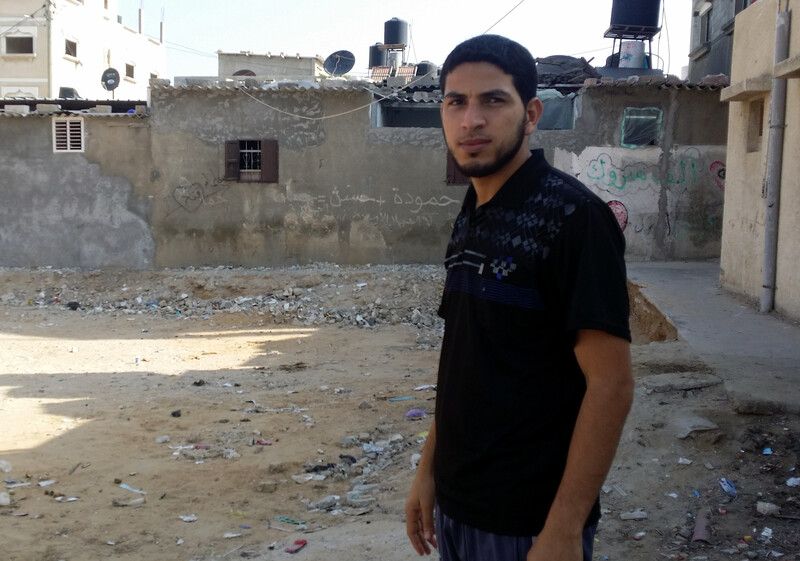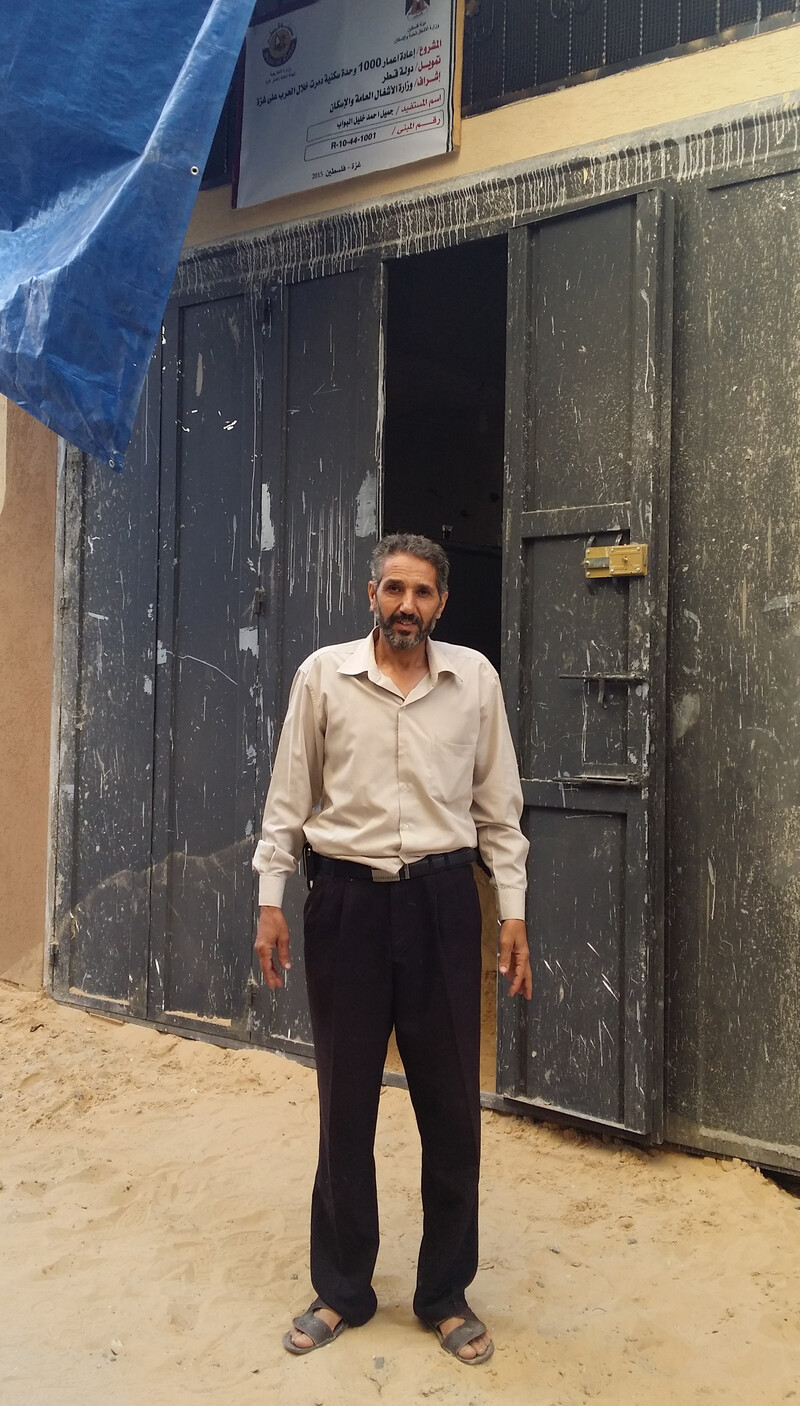The Electronic Intifada 29 October 2015

Ahmad al-Hamayda stands at the site of his destroyed home in Khan Younis.
For more than a year, Ahmad al-Hamayda, his six siblings and their elderly parents have been forced to live in a cramped apartment. Their two-story house in Khan Younis, a city in southern Gaza, was totally destroyed by Israel during 2014.
Al-Hamayda had spent all of his 24 years in that house. At the time Israel dropped its bombs, the family had just been evacuated after a neighboring building was hit by a small missile. This was interpreted as a warning that a larger assault on the surrounding area was imminent.
“We turned back to see our home was reduced to rubble,” al-Hamayda said.
Promises have been made by officialdom that the house and others in the neighborhood will be rebuilt with aid from Kuwait. Yet none of the $200 million pledged by Kuwait in Cairo has been made available, according to World Bank data.
“Whenever I go to ask the [Gaza] housing ministry, they keep on delaying things,” al-Hamayda said. “It has been very frustrating.”
As their uncertainty continues, the al-Hamayda family struggles to make ends meet. The United Nations has covered their monthly rent of $200 for the apartment where they now live on just two occasions in the past year. The rest of the time the family has had to pay the full amount themselves.
Their plight is in no way unique.
UNRWA, the UN agency for Palestine refugees, reported last week that 13,167 refugee families in Gaza remain displaced because of the damage done to their homes by Israel’s 2014 attack.
So far, just one refugee family has had its home completely rebuilt, with the agency’s support.
Adnan Abu Hasna, a spokesperson for UNRWA, said that the agency had finished its repairs on some 70,000 homes which had been partially damaged in the Israeli attack.
Shortfall
“We try to give priority to large families in many cases,” he told The Electronic Intifada. Yet he acknowledged that many families have not received any assistance because of a funding shortfall.
Twelve months have elapsed since an October 2014 reconstruction conference for Gaza was held in Cairo. Only around 35 percent of the $3.5 billion pledged to Gaza on that occasion has been made available, according to the World Bank’s most recent data.
Reconstruction has been further hampered by Israel’s refusal to allow many building supplies into Gaza, on the pretext that some items could prove useful to Hamas or other armed resistance groups.
Israel only removed import restrictions on aggregate material required for construction this month. The Israeli authorities are still limiting the amount of concrete, steel bars, electrical goods, pipes and wood thicker than one centimeter that may enter Gaza.
According to UNRWA, aid agencies have to deal with a “lengthy and cumbersome approval process” in order to access essential material.
The World Bank reported last month that UNRWA “claims it incurred $7.5 million in additional costs in 2014 alone, which is equivalent to the cost of building four UNRWA schools, as a result of Israeli requirements on access and monitoring of imported materials into Gaza.”
Living in ruins

Jameel al-Bawab outside his rented flat.
Najwa Abuktifa’s husband died three months ago. As a result, she has to look after five teenagers on her own.
The family are living in what remains of their home in Beit Hanoun, a village in the north of Gaza.
“I have no alternative,” she said.
She has been promised $5,000 in aid by the authorities. “I did not receive even one dollar,” she said. “And even the full amount that has been pledged would not be enough to repair my badly damaged home.”
Maryam Hassan, 57, has to share a small rented flat with her four sons, two of whom are married with children. Her husband was also killed when Israel shelled their home in Rafah, near Gaza’s border with Egypt, last year.
The flat is located on the fifth floor of a building. Climbing up to it proves difficult for Hassan, who has osteoarthritis.
“The UN has promised to bring us the construction materials that we need [to repair our home],” she said. “We have been waiting for long time for this promise to come true.”
The home of Jameel al-Bawab, 53, was flattened during what has become known as Black Friday — a 1 August 2014 offensive against Rafah. Between 135 and 200 civilians were killed by Israel in that massacre.
“We lost our belongings, furniture, and more than $7,000,” al-Bawab said.
Last month, he received some aid from Qatar to begin building a one-story home for his family.
Before moving into a flat, he and 14 members of his family had to share three tents between them. Their time in tents lasted more than six months, including an often harsh winter.
Thousands of families in Gaza are facing yet another winter without adequate shelter.
Isra Saleh el-Namey is a journalist from Gaza.





